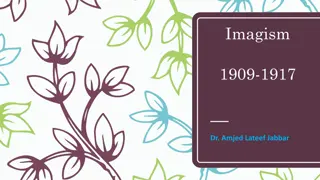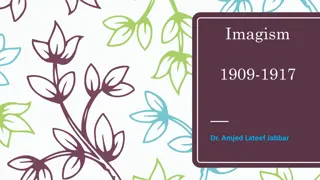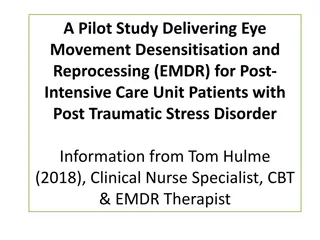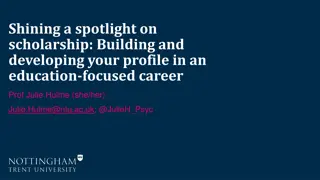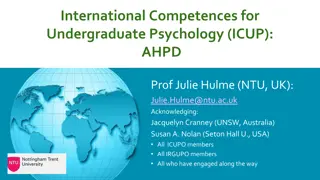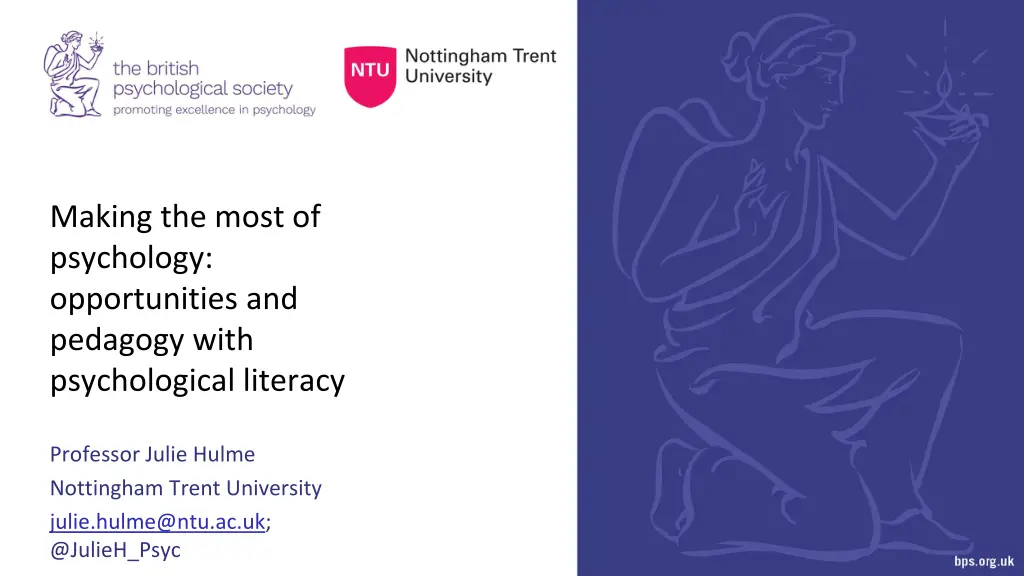
Enhancing Psychological Literacy and Education Opportunities
Explore the interdisciplinary nature of psychology, the purpose of higher education, and the concept of psychological literacy. Discover how psychology touches on various aspects of human life and learn about the importance of personal, professional, and societal domains in education. Dive into the world of psychological literacy to adaptively apply psychology in diverse areas for individual and societal well-being.
Download Presentation

Please find below an Image/Link to download the presentation.
The content on the website is provided AS IS for your information and personal use only. It may not be sold, licensed, or shared on other websites without obtaining consent from the author. If you encounter any issues during the download, it is possible that the publisher has removed the file from their server.
You are allowed to download the files provided on this website for personal or commercial use, subject to the condition that they are used lawfully. All files are the property of their respective owners.
The content on the website is provided AS IS for your information and personal use only. It may not be sold, licensed, or shared on other websites without obtaining consent from the author.
E N D
Presentation Transcript
Making the most of psychology: opportunities and pedagogy with psychological literacy Professor Julie Hulme Nottingham Trent University julie.hulme@ntu.ac.uk; @JulieH_Psyc 1
The nature of psychology Psychology is an unusual discipline, drawing on natural sciences, social sciences and philosophy (Quality Assurance Agency, 2016). It encompasses all aspects of what it is to be human, covering biology and neuropsychology, social interaction and cultural context, cognitive processing, development from pre- birth to death, all of the things that humans share in common, and all of the ways in which we are diverse. As such, it touches on the life experiences of each and every one of us, and at the same time requires us to study those experiences within an academic context. Hulme & Kitching (2017). The nature of psychology: Reflections on university teachers experiences of teaching sensitive topics. Psychology Teaching Review, 23, 1, 4-14. 2
What is (higher) education for? The aim of education is not only to prepare students for productive careers, but also to enable them to live lives of dignity and purpose; not only to generate new knowledge, but to help shape a citizenry that can promote the public good. Thus, higher education s vision must be widened if the nation is to be rescued from the problems that threaten to diminish permanently the quality of life. (Boyer, 1990, p77-78). 3
Psychological literacy The general capacity to adaptively and intentionally apply psychology to meet personal, professional and societal needs (Cranney et al, 2012). Hulme, J.A. (2014). Psychological literacy: from classroom to real world. The Psychologist, 27, 12, 932-935. Hulme, J.A. & Cranney, J. (2021). Psychological literacy and learning for life. In: Zumbach, J., Bernstein, D., Narciss, S., & Marsico, P. (Eds.). International handbook for psychology learning and teaching. New York, Springer. International handbook of psychology learning and teaching. New York: Springer. Cranney, J, Dunn, DS, Hulme, JA, Nolan, S, Morris, S and Norris, K (2022) Psychological literacy and undergraduate psychology education: An international provocation. Frontiers in Education, 7. ISSN 2504-284X 4
Personal, professional, societal/community domains Wellbeing: A complex multi-dimensional concept that incorporates functioning well , good relationships with others, belonging, developing, thriving or flourishing (Huppert, 2013). Employability: ... a set of achievements skills, understandings and personal attributes that make graduates more likely to gain employment and be successful in their chosen occupations, which benefits themselves, the workforce, the community and the economy (Yorke, 2006, p. 8). Global citizenship: A global citizen is someone who is aware of and understands the wider world and their place in it. They are a citizen of the world. They take an active role in their community and work with others to make our planet more peaceful, sustainable and fairer. (Oxfam, 2022). 5
Implications for psychology teaching We must both (a) recognise the relevance of psychology to students personal lives, and (b) facilitate their self-awareness of the ways in which this personal meaning can impact on their ability to evaluate evidence and to make informed decisions. (Hulme & Cranney, 2021) Promoting psychological literacy entails reorienting what and how we teach students in a way that emphasizes Psychology s relevance . Dunn et al. (2011, p. 16) 6
Inclusive education Half the curriculum walks in the room with the students Style (2014). Curriculum as encounter: Selves and shelves. English Journal, 103.5, 67-74. p. 67. the ways in which pedagogy, curricula and assessment are designed and delivered to engage students in learning that is meaningful, relevant and accessible to all. It embraces a view of the individual and individual difference as the source of diversity that can enrich the lives and learning of others Hocking, C. (2010). Inclusive learning and teaching in higher education. Available from: https://www.advance-he.ac.uk/knowledge-hub/inclusive-learning-and-teaching-higher-education- synthesis-research. p. 1. 7
Concluding thoughts Constructive alignment learning outcomes, teaching and learning activities, assessment Authenticity Pedagogy for inclusion Psychologically literate educators 8

